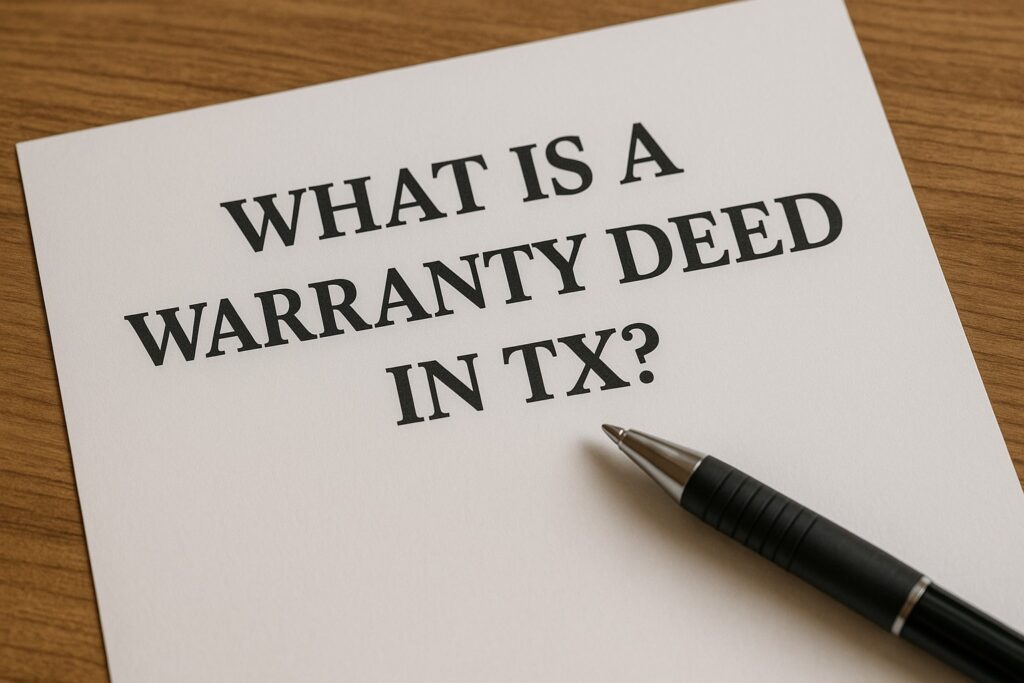
If you’re buying or selling real estate in the Lone Star State, you’ll likely come across a document called a warranty deed. You may be wondering: What is a warranty deed in TX? Why does it matter? How does it affect your rights?
In simple terms, a warranty deed is a promise. It guarantees that the person selling the property has a clear title and the legal right to transfer it. Understanding this document is an essential step in protecting your investment.
What Is a Warranty Deed?
Let’s begin with the fundamental question: What is a warranty deed? A warranty deed is a legal document used in real estate transactions. It transfers property ownership from one party (the seller, or “grantor”) to another (the buyer, or “grantee”).
Unlike other types of deeds, it comes with strong guarantees. By signing it, the seller promises that they legally own the property, that the title is free of hidden claims or liens, and that they will defend the buyer’s ownership if someone challenges it.
What Is a Warranty Deed Used For?
A warranty deed is most often used in real estate sales where the buyer wants complete protection. For example, when purchasing a home, land, or commercial property, the buyer usually receives a warranty deed because it offers the highest level of security. This document reassures the buyer that they are not inheriting old debts, hidden liens, or ownership disputes tied to the property.
Types of Warranty Deeds in Texas
Not all warranty deeds are the same. Texas law recognizes two main types:
- General warranty deed. This deed provides the broadest protection. The seller guarantees that the title is clear of defects, liens, taxes, or claims from any point in time, even before they owned the property.
- Special warranty deed. This deed offers narrower protection. The seller only guarantees that no problems with the title arose while they owned the property. They don’t make promises about issues from prior owners.
Both transfer ownership, but the type used depends on the transaction and the level of protection the buyer expects.
What Does a Warranty Deed Look Like?
So what does a warranty deed look like? While the exact wording can vary, a Texas warranty deed usually includes:
- The names of the buyer and seller. These clearly state who is transferring the property and who is receiving it.
- A legal description of the property. This goes beyond the street address and identifies the land by its lot, block, and survey details.
- Warranties and guarantees. These clauses spell out the promises the seller is making about the title.
- Signatures and notarization. For the deed to be valid, the seller must sign it before a notary public.
To make the transfer official, you must file the completed deed with the county clerk where the property is located.
Why Warranty Deeds Matter in Texas
Warranty deeds directly impact your ownership rights. Without one, you might buy a property with unpaid taxes, liens, or ownership disputes attached. That could lead to expensive legal battles down the road. A warranty deed gives you the peace of mind that your ownership is solid and legally protected.
Common Mistakes People Make with Warranty Deeds
When it comes to deeds, even small mistakes can create big problems. Common pitfalls include:
- Using the wrong type of deed. Choosing a deed that doesn’t offer the right level of protection can leave you vulnerable.
- Incorrectly describing the property. An incomplete or inaccurate legal property description can cause title confusion, boundary disputes, or invalidate the deed.
- Overlooking title issues. Even with a warranty deed, conducting a title search is wise to confirm the property is free of liens or disputes.
- Vague or ambiguous deed language. Unclear terms in the deed can lead to later challenges.
- Failing to record the deed. If the warranty deed is not filed with the county clerk, the transfer is not officially recognized, and no public record exists. Recording the deed tells others you are the rightful owner, preventing future disputes or competing claims.
Taking these steps seriously can save you from legal and financial trouble later.
The best way to avoid these pitfalls is to work carefully and deliberately when preparing or reviewing a warranty deed. Double-check that the property description is accurate, use clear language, and ensure the deed is recorded correctly. Working with a land surveyor can help confirm that the legal description matches the property boundaries. Title companies and attorneys can identify hidden issues and ensure the deed is legally sound. Together, these steps can protect your rights and give you peace of mind during the transfer.
Why Work with Massingill?
If you came here wondering, “What is a warranty deed in TX?” You’re not alone. It’s a common question with significant implications. Whether you’re buying your first home, selling land, or transferring property to family, our team at Massingill can help safeguard your rights.
Real estate transactions are among the most significant financial decisions people ever make, so correctly prepared paperwork is essential. At Massingill, we’ve helped countless Texans protect their investments through careful preparation of warranty deeds and other real estate documents.
Our attorneys bring both legal skill and a commitment to the local community. They have deep experience in real estate, business law, and litigation with practical insight gained from serving as general counsel, legislators, and community leaders. This diverse background allows us to anticipate challenges, draft clear documents, and protect your investment. Massingill has the knowledge, foresight, and business acumen to make the process smooth and secure.
Contact us today to discuss your situation and protect your rights in your next real estate transaction.

